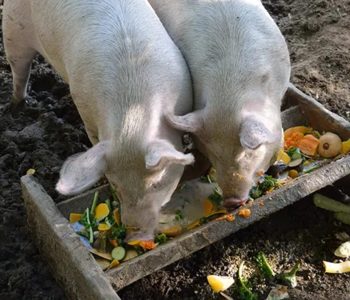Closing the Loop: How Scientists in Sweden Are Turning Organic Waste into Animal Feed
♻️ From waste to resource: New solutions for circular feed systems
Could yesterday’s waste become tomorrow’s animal feed?
A Swedish research team is working on exactly that. Led by Associate Professor Olivier Keech from Umeå University, the project is developing novel fermentation and pelleting techniques to turn forestry and food industry residues into sustainable, high-quality feed for poultry, pigs, and shrimp.
“We’re not just improving feed—we’re designing a system that closes the loop,” says Keech.
“It’s about reducing waste, supporting local economies, and cutting the carbon footprint of food production.”
The project is supported by the Kamprad Family Foundation for Entrepreneurship, Research & Charity, with 6.6 million SEK in funding over three years.
Unlocking the potential of hard-to-digest residues
Every year, Nordic industries generate massive amounts of sawdust, brewery by-products, and municipal food waste. These materials are rich in energy but are difficult for animals to digest due to their cellulose and lignin content.
By breaking down these tough fibers and fermenting the released sugars with tailored microbes (bacteria and yeast), the team aims to produce protein-rich, pelleted animal feed.
Feed that strengthens immunity
Beyond just nutrition, fermented feed also supports animal health. Thanks to the natural probiotic properties of the microbes used in the process, the feed may help strengthen the gut and immune systems of farmed animals.
Researchers are testing different microbial combinations to match the specific needs of chickens, pigs, and shrimp.
A multidisciplinary powerhouse
This project brings together four leading scientists across multiple fields:
-
Olivier Keech, project lead and Associate Professor at the Umeå Plant Science Centre
-
Leif Jonsson, Professor of Chemistry at Umeå University, expert in hydrothermal catalysis
-
Volkmar Passoth, Professor at the Swedish University of Agricultural Sciences (SLU), specialist in food biotechnology
-
Anders Kiessling, Professor at SLU, working on sustainable nutrition and nutrient recycling in closed farming systems
Lab to aquaculture: Putting research into practice
Initial experiments will take place in the lab, but the team will soon begin pilot testing at the Östersjöfabriken research platform in Västervik. These trials will evaluate the new feed’s performance in modern aquaculture systems, focusing on shrimp and fish production.
Looking ahead: Building a resilient, circular food future
The project reflects a broader shift in how we think about waste—not as a burden, but as a resource. By upcycling industrial residues into nutritious animal feed, the research tackles multiple challenges at once: reducing landfill waste, cutting emissions from feed production, and creating resilient, localized food systems.
“This is about rethinking our entire food value chain,” Keech emphasizes.
“By combining science, sustainability, and local innovation, we can build smarter food systems that work for both people and the planet.”
Source: Umeå University. (2024, May 13). New project aims to turn residues into high-quality animal feed. Retrieved from: https://www.umu.se/en/news/new-project-aims-to-turn-residues-into-high-quality-animal-feed_12098536
